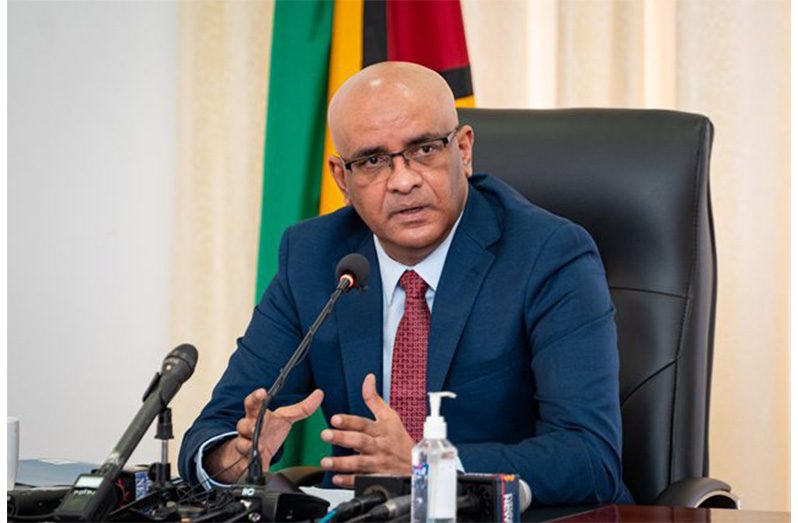THE government has outlined a new phase in strengthening Guyana’s social safety net, unveiling incoming reforms to modernise the public assistance system and new measures that will see expanded support for working families, including state-funded childcare facilities.
Vice President, Dr Bharrat Jagdeo made these announcements last week during a press conference at the Arthur Chung Conference Centre (ACCC), where he spoke extensively on improving access to benefits for vulnerable and low-income families.
As he continued to explain some of the incoming reforms to Guyana’s public assistance system—including to the Board of Guardians — he pledged a fairer, faster, and more transparent process for citizens seeking social support.
He said: “In terms of what we fund for the five years in government—social security, people who are eligible for help on public assistance. The complaint has been… through the Board of Guardians… And so clearly, we have to reform the system. And the system is currently being reformed.”
The Ministry of Human Services and Social Security’s Public Assistance programme remains a lifeline for thousands of Guyanese, providing temporary relief to persons with disabilities and those experiencing severe financial hardship.
In August, President, Dr. Irfaan Ali announced that the public assistance given to vulnerable citizens will be increased to a minimum of $40,000.
This venture, he said, means an additional $19 billion will be spent annually on vulnerable groups.
Currently, public assistance is $22,000 and this has injected an additional $1.4 billion into the pockets of some 40,000 recipients across the country.
Earlier this year, the Government of Guyana demonstrated its commitment to strengthening social safety nets by allocating a substantial $58.5 billion budget to the ministry for 2025.
Further, the Vice President made it clear that if a citizen is in a low-income bracket, then they should be able to qualify for benefits once they meet certain metrics.
“And those metrics would be clearly identified by the Board of Guardians and then implemented. It’s either you meet the metrics or not—you qualify under those metrics. And once that is done, then the people who are implementing the system cannot capriciously say you’re eligible or not eligible based on their own, maybe, prejudices,” Dr Jagdeo said, adding: “If you’re disabled, then automatically you should be on the system…What I’m conveying is that work is being done on improving this system, so that we can roll it out next year, allowing people to get benefits faster, and for those who are eligible to be able to get onto the database swiftly on the basis of existing criteria, through which they would be qualified. I want to say to people, work is being done on that, too, because that was one of the big complaints we had.”
SUPPORT FOR PARENTS
Turning his attention to parents, Dr Jagdeo said in the new budget, the government is looking at ways to support daycare centres across Guyana.
He said: “We want to see how we can support the creation and establishment of daycare centres in communities to support working mothers, particularly. Whether we do it through a taxation system, co-invest, give a grant, or a voucher—we are still examining which of these methods we’d be using to support this promise that we made in the elections.”
Earlier this year, President, Dr Irfaan Ali pledged “targeted and serious” investments in childcare infrastructure and services aimed at supporting young professionals, particularly women, who are navigating career aspirations and family life.
The benefits of daycare are well documented. Beyond providing supervision, high-quality daycare supports children’s developmental, social, and emotional growth. Research shows that even children as young as five who attend daycare are more patient and better able to adapt their communication to interact with playmates of varying ages. For parents—especially mothers—daycare enables greater participation in the workforce, supporting career advancement and promoting gender equity in professional spaces.
In August, Guyana’s first Day and Night Care and Early Childhood Centre was officially opened at Anna Catherina, West Coast Demerara.
This facility is part of a broader initiative to establish similar centres across the country. It operates 24 hours a day, providing early childhood development services to support working parents with non-traditional hours. These centres are designed to help parents advance their professional lives, increase their disposable incomes, and expand their economic opportunities.
During the day, the centre cares for children from newborns to three years old, while at night, it accommodates children up to 12 years old.
The second will be built in Region Four at a cost of $94 million.
Since assuming office in 2020, there has been a series of pro-family policies rolled out by the People’s Progressive Party/Civic (PPP/C) government.
Additionally, each child will now benefit from a $200,000 grant annually.
The newly introduced transportation grant which aims to ease the cost of burden on families, will provide each school child with $100,000. This grant will be used by parents to support transportation needs, especially for those in hinterland and remote communities.
This policy will see a yearly injection of $40 billion being placed back into the pockets of Guyanese parents. This year, each eligible child received a total of GYD $55,000, which included the GYD $50,000 ‘Because We Care’ cash grant and a GYD $5,000 school uniform and supplies grant. This education programme benefits learners who attend private and public schools.
Notably, in March of this year, the government introduced a $100,000 cash grant for every child born to a Guyanese mother, a programme hailed as a lifeline for new mothers and a firm commitment to the future of the country’s children.



.jpg)










